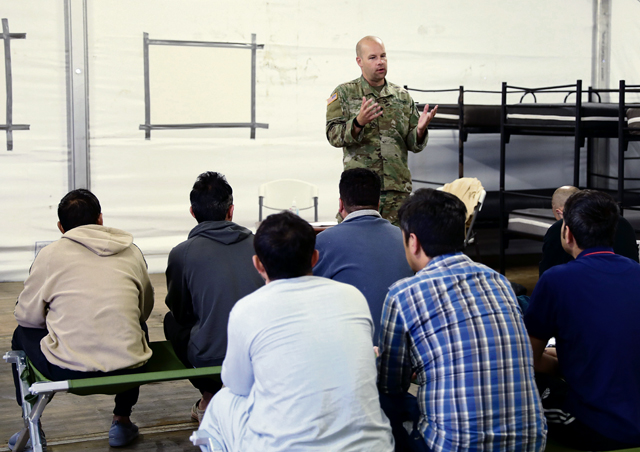There is no “typical” Afghan traveler among the men, women and children currently living in the Logistical Support Areas at Rhine Ordnance Barracks in Kaiserslautern. They come from different tribes. They were farmers, soldiers, teachers and students. Some are married. Some are pregnant. Some speak English and have lived in the United States. For others, it is their first time outside their home country.

Their varied backgrounds, experiences, hopes and dreams form a kaleidoscope as they wait for their journey to America to come in to focus.
Afghan travelers who have already spent time in the U.S. know that understanding American norms will make the journey easier. With the support from U.S. Army Reserve Civil Affairs, the first traveler-led cultural integration class took place this week at ROB. About 60 male Afghan travelers attended.
“Learning about American culture is very important,” said Abdul Waheed, a Washington D.C. police officer from Afghanistan currently volunteering as a linguist. Waheed said familiarizing travelers with U.S. social services as well as what is considered socially appropriate in the U.S., can ease anxiety and stress, minimize misunderstandings and help travelers succeed in America.
That is the thinking behind the class, according to Spc. Carl Youngblood, 457th Civil Affairs Battalion, 361st Civil Affairs Brigade, 7th Mission Support Command. The 7th Mission Support Command is the only U.S. Army Reserve command stationed in Germany with units across Europe.
An Afghan traveler and Fulbright Scholar who has lived in the U.S. recognized the value of sharing basic information on what to expect from life in the U.S., according to Youngblood. He volunteered to lead the first “Intro to the USA” class, and based on the positive response, more are likely to follow.
“Everyone is really excited,” Youngblood said. “The word has spread. We found people who have lived in America and they’ve already volunteered to give their own classes, separate from the ones we’ve organized.”
The class, conducted in both Pashto and Dari, provided an introduction to life in the west, examined major differences between life in Afghanistan and life in the U.S. and encouraged participants to ask questions.
“It’s important to everyone that we help you with the transition to the U.S. and take advantage of the time we have here to have these cultural classes,” said Youngblood as he welcomed class participants. At the male-only LSA, class organizers ensured that each tent was represented, to enhance the distribution of information.
“In a sense, each tent is a tribe,” explained Youngblood. “We respect that cultural norm to ensure that the communication is going to everyone.”
Youngblood said supporting Operation Allies Welcome by facilitating cultural integration classes led by the travelers themselves is a perfect illustration of how U.S. Army Civil Affairs works.
“This is a real world event,” he said. “Everything that we’ve learned in our training, this is what it’s been for—helping out the civilian populous that has been affected by some kind of event, whether that’s man made or a natural disaster.”
The traveler-led classes are one way Afghan travelers are helping each other realize their shared vision of a safe and happy future in the United States.


